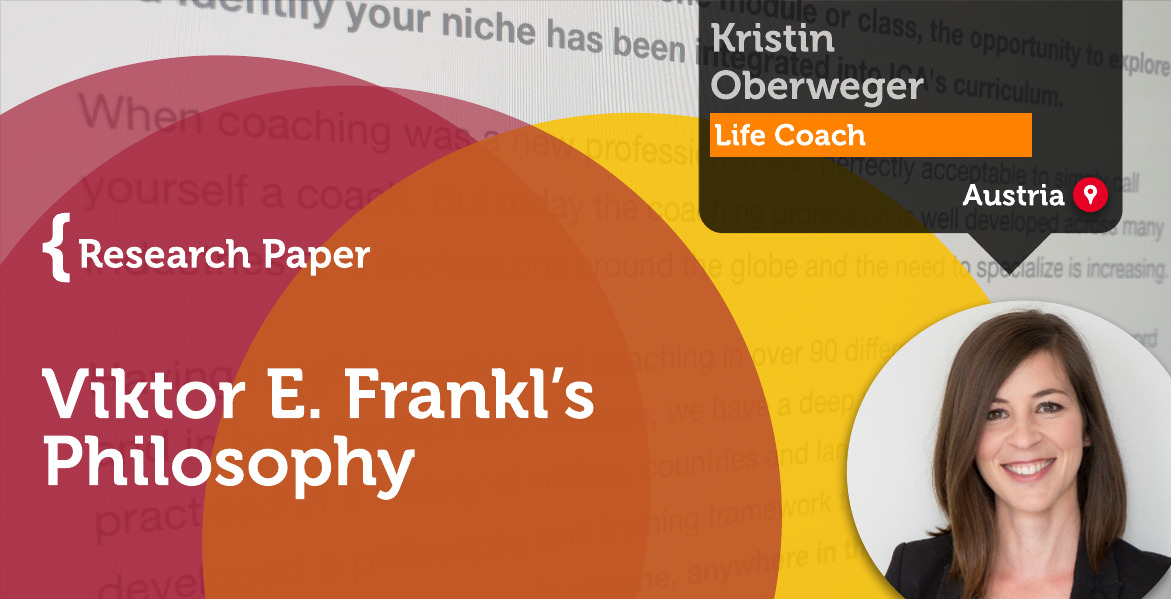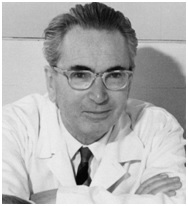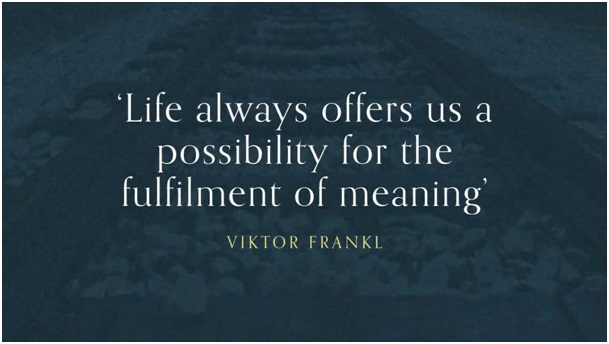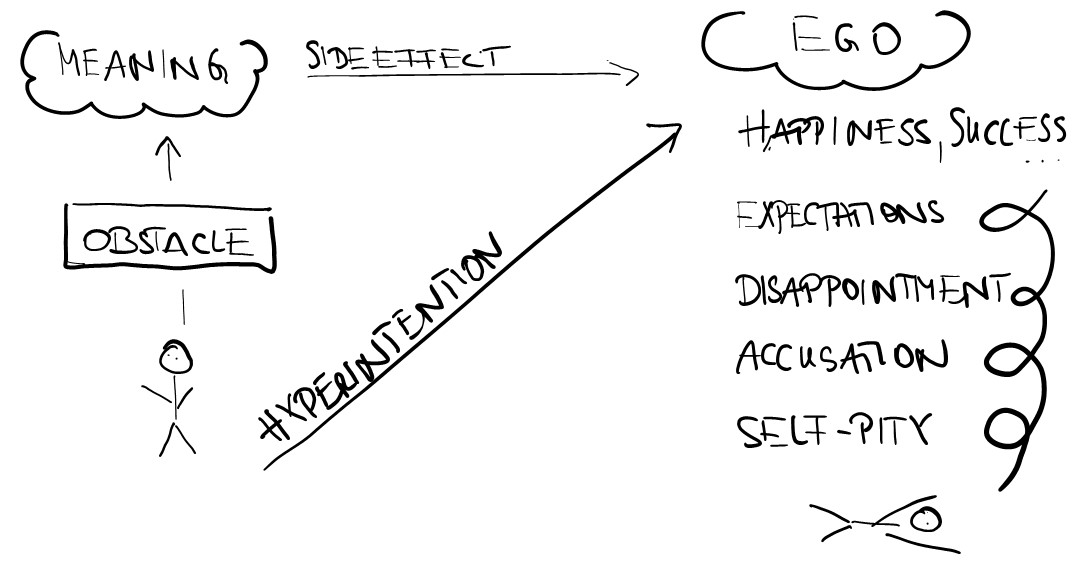A Research Paper By Kristin Oberweger, Life Coach, AUSTRIA

 |
 |
Viktor E. Frankl and My Coaching Approach
In my practice of systemic coaching, I follow Viktor E. Frankl’s theories and concepts. As I am Viennese, too and interested in Psychotherapy it was only a short step to dive deeper into his highly valued theories. Although he already died in 1997, his thoughts, philosophy, and therapy – the so-called Logotherapy – are more important than ever in this vulnerable and sometimes volatile, fast, and nowadays rough world. Regarding his philosophy “individually bringing and in a concrete situation the utmost best out of us for our beloved and for the world and humans” – is still a concept for freedom and harmony for the future world.
Frankl’s studies and his understanding of humankind can be seen as my “backbone” – the purpose why I believe that every client is capable to find resources inside him/herself to solve problems. Besides, I think we do definitely need more people with a feeling or a knowledge of meaning in their life – as this is the main prophylaxis for lapsing into depression and neuroses as a result of unfulfilled expectations regarding happiness or success.
In the following pages, I will introduce the person Viktor E. Frankl, his theories, and my personal approach to coaching due to my studies of logotherapy.
Viktor E. Frankl
26. März 1905 in Vienna, Austria; † 2. September 1997 in Vienna, Austria
Viktor E. Frankl was a professor of neurology and psychiatry at the University of Vienna and was a lecturer in the United States (Harvard University as well as at universities in Dallas and Pittsburgh). For him, the U. S. International University in California created a chair of logotherapy—the school of psychotherapy founded by Frankl, also referred to as the “Third Vienna School” (following Sigmund Freud’s psychoanalysis and Alfred Adler’s individual psychology). He held 29 honorary doctorates from universities around the world.
Frankl was the first non-American psychiatrist to be awarded the Oskar Pfister Prize, named after a disciple of Sigmund Freud, by the American Psychiatric Association; the Austrian Academy of Sciences elected him an honorary member.
His 32 books have been published in 32 languages. More than nine million copies of one single book were sold (“Man’s Search for Meaning”). The United States Library of Congress dubbed it “one of the ten most influential books in America”. Attribution: https://www.franklzentrum.org/english/viktor-e-frankl.html
The Concept of Logotherapy
The development of LTEA (Logotherapy) dates back to the 1930s. On the basis of Sigmund Freud’s Psychoanalysis and Alfred Adler’s Individual Psychology, the psychiatrist and neurologist Viktor Emil Frankl (1905-1997) laid down the foundations of a new and original approach which he first published in 1938. Logotherapy/Existential Analysis sometimes called the “Third Viennese School of Psychotherapy”, is an internationally acknowledged and empirically based-meaning-centered approach to psychotherapy.
In Logotherapy/Existential Analysis (LTEA) the search for meaning in life is identified as the primary motivational force in human beings.
Frankl’s approach is based on three philosophical and psychological concepts:
-
- Freedom of Will
- Will to Meaning
- Meaning in Life
Attribution: https://www.univie.ac.at/logotherapy/logotherapy.html
A Quick Explanation of Logotherapy:
The notion of “Logotherapy” was created with the Greek word logos (“meaning”). Frankl’s concept is based on the premise that the primary motivational force of an individual is to find meaning in life. The following list of tenets represents basic principles of logotherapy:
-
- Life has meaning under all circumstances, even the most miserable ones.
- Our main motivation for living is our will to find meaning in life.
- We have the freedom to find meaning in what we do, and what we experience, or at least in the stance, we take when faced with a situation of unchangeable suffering.[2] Attribution: https://en.wikipedia.org/wiki/Logotherapy
Meaning in Life
LTEA is based on the idea that meaning is an objective reality, as opposed to a mere illusion arising within the perceptional apparatus of the observer. According to LTEA humans are called upon, on the grounds of their freedom and responsibility, to bring forth the possible best in themselves and in the world, by perceiving and realizing the meaning of the moment in each and every situation. In this context, it must be stressed that these meaning potentials, although objective in nature, are linked to the specific situation and person, and are therefore continually changing. Thus LTEA does not declare or offer some general meaning of life. Rather, clients are aided in achieving the openness and flexibility that will enable them to shape their day-to-day lives in a meaningful manner. Attribution: https://www.univie.ac.at/logotherapy/logotherapy.html
VIDEO “The will to meaning” Viktor E. Frankl (University Vienna):
https://www.univie.ac.at/logotherapy/assets/vid/clip_will_meaning.mp4
In this video, Viktor E. Frankl explains the importance of supporting clients/humans to (re)find their will to meaning.
Although Viktor E. Frankl wrote his first books in the 1930s, his work is still highly acknowledged by well-known researchers and philosophers:
Frankl’s main contribution to the world of psychotherapy was what he called “logotherapy”, which treats psychological problems by helping people find meaning in their lives. Rather than just seeking happiness, he proposed, we can seek a sense of purpose that life offers us. (Daniel Goleman in the introduction of “Yes to life” by Viktor E.Frankl 1988, 2020)
Viktor E. Frankl’s Therapy as a Mindset for Coaches:

In this diagram, you see what Frankl originally meant in the video. Humans, who know their meaning(s), have clear goals, and live in a self-transcendent way will also have the power to overcome obstacles along the way. Finding strength in the will to meaning very often has the side-effect of a satisfied ego, finding happiness and success. But in Frankl’s concept, these can never be the main goals as when we only help our clients to find e.g. more happiness, their desire can never be fulfilled completely. Disappointment, sorrow, and exhaustion might happen when a human is only focused on getting more of, what I call “ego-food”. Neurosis, fear, and depression may then be occurring and these humans need professional help to overcome these obstacles – get a new sight onto life and discover the meaning of their life (again). Frankl’s Logotherapy provides a profound mindset for coaches to work with struggling clients – helping them to find meaning in the moment and over their whole life.
A quote which I found in one of his famous books:
Rabindranath Tagore:
I slept and dreamt – that life was joy.
I awoke and saw that life was duty.
I worked – and behold, duty was joy.
… and there is certainly joy in life too, but it cannot be pursued, cannot be ”willed into being” as joy, rather, it must arise spontaneously, and in fact, it does arise spontaneously, just as an outcome may arise: happiness should not, must not and can never be a goal, but only an outcome,; the outcome of the duty…..(Yes to life, Viktor E. Frankl. 1988/2020, S. 37)
While fulfilling meaning in this world (Frankl’s credo was: the best/ to realize for me, my family, my beloved, and the world in this concrete situation) will make a human satisfied and leave him rich in a meaningful sense at the end of his/her life.
Coaching and Logotherapy also have a kind of “strategy” in common. They both believe in the inherent strengths of the client/human to find solutions or future goals for a better life.
Frankl’s method is the so-called:
Copernican revolution (phrase formerly used by Immanuel Kant):
(Yes to life, Viktor E. Frankl. 1988/2020, S. 37)
…. At this point it would be helpful, as we might say with Kant, to perform a Copernican revolution, a conceptual turn through 180 degrees, after which the question can no longer be: “What can I expect from life?” but can only be: “What does life expect of me?” What task in life is waiting for me?
… it is not we who are permitted to ask about the meaning of life, it is life that asks the questions, directs questions at us – we are the ones who are questioned! We are the ones who must answer, must give answers to the constant, hourly question of life, to the essential “life question”. Living itself means nothing other than being questioned; our whole act of being is nothing more than responding to – of being responsible towards – life. From this mental standpoint, nothing can scare us anymore, no future, no apparent sense of futility. Because now the present is everything, as it holds the eternally new question of life for us. Now everything depends on what is expected of us.
…. The question life asks us, and in answering which we can realise the meaning of the present moment, does not only change from hour to hour but also changes from person to person: the question is entirely different in each moment for every individual.
Reconnecting a client with the attitude of self-responsibility – taking his/her life back into his/her own hands – is helping the client to leave the role of a victim. It is purely empowering the client!
Combined with the Copernican revolution is the belief of Frankl that “behind every sorrow, you find a value”.
Whenever a client tells us about his/her sorrow and pain Logotherapists try to focus with the client on the capacities and resources of the client he/she has although there are severe problems now. For e.g. a person who is very much complaining about a family life full of conflicts – is actually focused on peace and harmony – and wants to live a “pro-live” mindset with warmth and love. When we help clients to find their values which are hidden behind their sorrows, it helps to find resources and to get more easily into action.
Frankl’s Understanding of Self-Transcendence, Self-Detachment, and Self-Actualization
…. But logotherapy…. following man into the human dimension, where it may draw upon the resources that are available there alone – resources such as the uniquely human capacities of self-transcendence and self-detachment. (The unheard cry for meaning – Viktor E. Frankl 1978)
Frankl also sees self-transcendence and self-detachment as prior resources in every human for finding solutions, meaning in life, and experiencing growth. As for self-detachment he especially points out the quality of humor – humor always gives the possibility of taking distance, looking at a problem from another view, and detaching from a too strong emotional status.
Another important aspect of Frankl’s work regarding coaching is, that he differentiates self-transcendence and self-actualization in a very interesting and remarkable way.
In his understanding and philosophy self-actualization is not the goal – a meaningful life can only be experienced when we focus on the outside world. He describes his thoughts in this video – which I unfortunately only found in German, but I translated it into English for you:
https://www.viktorfrankl.org/assets/vid/clip_selbsttranszendenz.mp4
Translation in English
In a nutshell, this objectivity has to be included – and there it is, when we reorient people to meaning, they don’t find it in themselves, as the self-actualization theorists claim – Maslow, who coined this term, has long since stopped accepting it in recent years – he has signed my criticism of his theory….
Self-realization is all ok, but it is only to be reached by a detour via self-transcendence, via service to a cause/meaning, via love for a person
Self-transcendent is our eyes, i.e. and the ability of my eye to fulfill its function, to visually perceive the surrounding world, stands and falls with the inability to perceive itself (reflections exempted). Otherwise, it is sick (cataract, glaucoma…).
The normal eye does not see itself. It is the same with being human.
Self-transcendence means that man becomes completely himself and is completely man exactly in the measure in which he overlooks and forgets himself, by leaving completely himself behind in the service to a thing, in the fulfillment of a sense, in the devotion to a task or to a person, to a partner. There he becomes completely himself.
Translated with www.DeepL.com/Translator (free version)
Conclusion for My Work as a Coach
Frankl’s thoughts and philosophy are creating a mindset that humans do have unbreakable, resourceful, responding, creative and whole cores. As well as we learned in the systemic coaching approach, sound clients are capable to find their own solutions for their growth. Providing, holding, and even embodying this belief as a coach helps clients trust themselves and their capacities even more. As they see and perceive that there is someone (maybe the only one!) who truly believes in his/her strengths. Therefore, these strengths must be objectively extant!
“Holding this space” for a client during a session, helps the client to open up and to reconnect with his/her inner wisdom and awareness.
Also in a blended coaching style, we can inspire our clients to search for meaning in the outside world – not only to be occupied with searching in oneself – via self-actualization but to get into action and to get in contact with the world (again) – to find reconnection and abundance as a “side-effect”, as Frankl says.
References
www.franklzentrum.org
www.univie.ac.at/logotherapy/logotherapy.html
Elisabeth Lukas “Krisen bewältigen – Viktor E. Frankls 10 Thesen in der Praxis“, 2018, S. 93
Yes to life, Viktor E. Frankl. 1988/2020, S. 37
The unheard cry for meaning – Viktor E. Frankl 1978
www.viktorfrankl.org